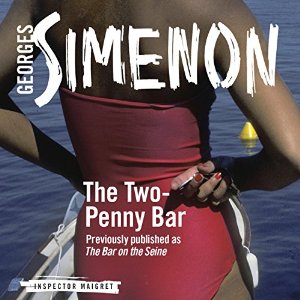Maigret did not leap full grown from Simenon’s brow, as Athena did from Zeus. No, he developed overtime. This is one of the early titles.
It is high summer and Maigret wanders around, seemingly with few responsibilities. Madame (Louise) Maigret has gone away for the summer to visit her sister in Alsace, and in her absence he haunts restaurants and bars, and falls in with the crowd at the ‘Two-Penny Bar’ along the Seine in the Ile de France. When a crime occurs under his nose, he muses quite a bit and asks a few questions, but keeps drinking with the crowd, whose members do not seem to mind having a police officer in their midst.
His rapport with the English ex-patriot James is engaging. James keeps popping up and it is evident that he is part of the plot, despite his detached manner.
The sketches of summer heat and blinding light along the Seine make a reader feel warm.
Madame Maigret is, as ever, patient, and long-suffering in silence.
The published title in 1932 as ‘La Guinguette à deux sous’, it was translated into an English edition years ago as ‘The Bar on the Seine.’ A ‘guinguette’ is a small, rustic bar with music and dancing, often to be found in the countryside. Perhaps the equivalent English term is a tavern – nothing fancy and not much in the way of food. ‘Roadhouse’ might also apply.

In the French ‘deux sous’: one ‘sou’ + one ‘sou’ = two sous.’ There were 100 ‘sous’ in a franc in those days. A ‘sou’ bought very little, even in 1932. Hence the idiom, not worth a sou (‘ne vault pas un sou’).
For reasons best known to the translator, and I suspect even better known to the publisher, it has been rendered as ‘two-penny.’ Yet later we read of francs. How many pennies to a franc, one wonders.
‘Two-penny’ is not an English idiom, per my web investigation. It seems to be idiosyncratic, fabricated for this title. That is bound to communicate to the reader, eh!
Why do I emphasise this usage by devoting space to it? Because the justification proudly displayed on the Penguin web site for these new translations of the Maigret books that it is marketing is to offer more literal, more authentic translations closer to the original. We can be pretty sure no one along the Seine in 1932 was paying with pennies. One may also wonder about the business sense of deprecating one’s own previous products, too, because after all Penguin editors commissioned and published those earlier translations. If they were as bad as now claimed, does that not undermine confidence in the present crop? Well it does when pennies go into francs. What will future editors at Penguin say about these translations?
I am equally dubious about the woman’s bathing suit that graces the cover of the copy I have. I rather doubt it was worn in 1932. Most swim-ware at the time would have been made of wool, I suspect, and have likely been more modest than the red number on the cover. ‘Fuzzylizzie swimwear’ confirms my hunch.
